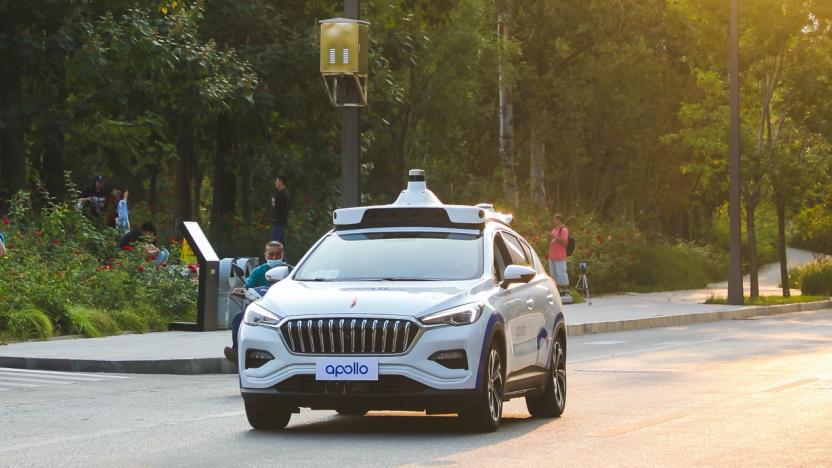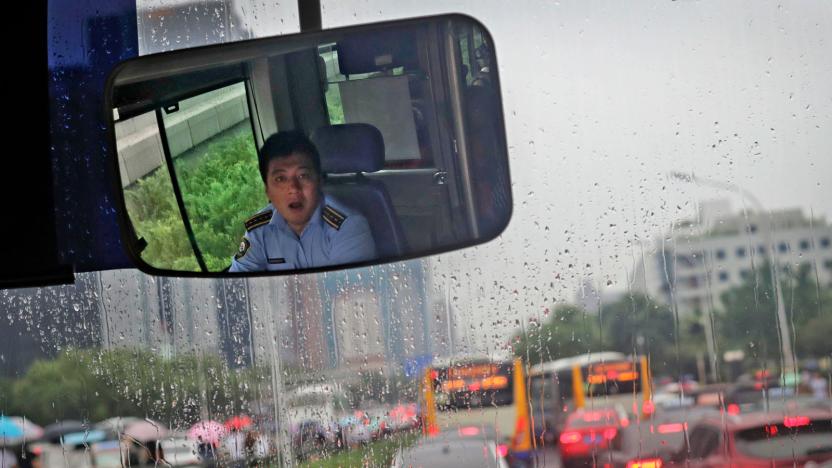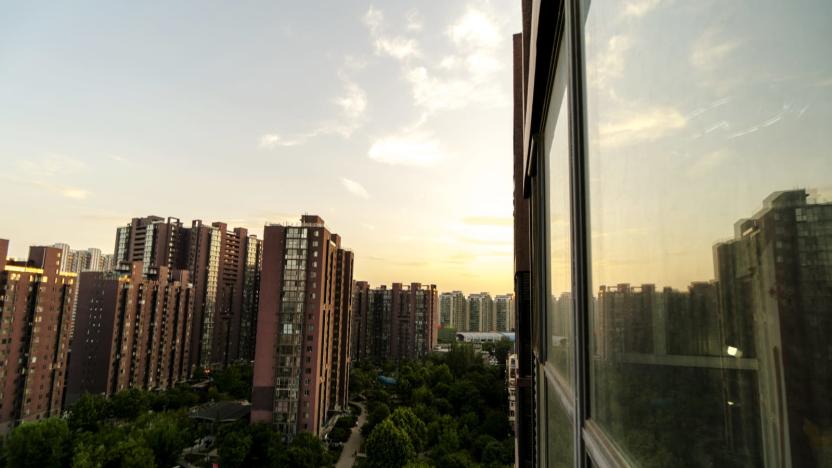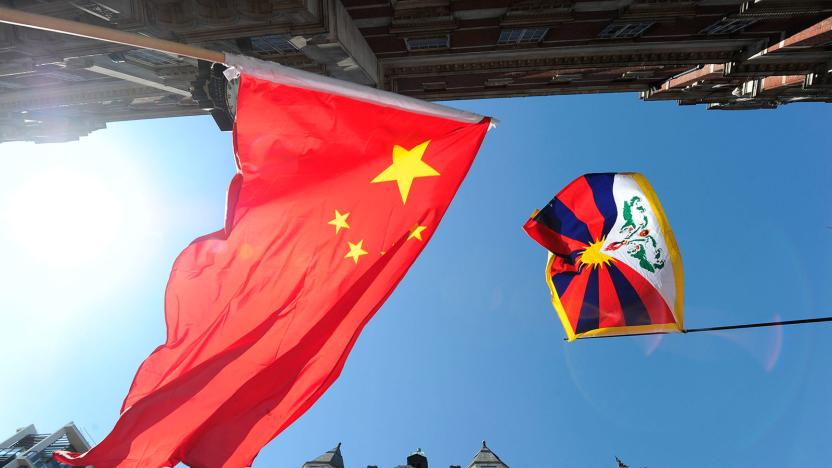Beijing
Latest

China reportedly orders state-owned mobile carriers to replace foreign chips
According to the Wall Street Journal, China's Ministry of Industry and Information Technology has ordered state-owned mobile operators, including the two biggest carriers in the country, to phase out foreign processors.

How to watch the 2022 Beijing Winter Olympics: A comprehensive streaming guide
Every event from Beijing is available to watch – you just have to know where to look.

Xiaomi's upcoming EV factory will make up to 300,000 cars per year
Xiaomi is launching its EV efforts by building a Beijing factory that can make up to 300,000 cars each year.

Baidu approved for fully driverless road tests in Beijing
It's the first time China's capital city has granted such permits.

LG's transparent OLED displays are on subway windows in China
LG is bringing transparent OLED displays to subway trains in Beijing and Shenzhen.

Intel's Mobileye will help China's public transport go autonomous
Mobileye is making a big push for autonomous driving in China, albeit not in the way you might expect. The Intel-owned company is "exploring" two major deals to use its self-driving tech in the country, most notably for mass transit. It's hoping to team up with Beijing Public Transport Corporation and Beijing Beytai to roll out driverless mass transit services in China, including the development of Level 4 (fully autonomous in specific conditions) tech and the creation of an industry standard. If everything goes forward, it could be ready in 2022.

Beijing uses face-detecting smart locks to curb public housing abuses
China's ever-growing reliance on facial recognition is spreading to public housing. Beijing is ramping up the use of face-detecting smart locks in public housing projects to bolster security for tenants (such as denying access to strangers) and crack down on abuses like illegal sublets. It even asks management to check on senior residents if they haven't entered or left their homes after a certain period of time.

Ford and Baidu team up to test autonomous cars in China
There's a new partnership in the autonomous vehicle game as Ford has announced it will be teaming up with Chinese internet company Baidu to work on autonomous vehicles, with testing set to begin in Beijing by the end of the year. The initiative hopes to achieve SAE L4 (a classification that measures level of human involvement) autonomous standards, meaning that vehicles can run autonomously within specific areas and under the correct weather conditions, within the next two years. And on the roads of Beijing, Ford will be joined by Mercedes-Benz, which too got approval to test cars in the capital city earlier this summer.

Google opens AI center in China even though it's still blocked there
Google has always had a rocky relationship with China. The search engine is banned in the country, along with its app store, email and cloud services, but that hasn't stopped the company from maintaining some level of presence with its international workforce. And that presence is set to grow following the announcement that Google is setting up an AI research center in Beijing.

China starts 200-day simulation of living on another planet
The US definitely doesn't have a monopoly on long-term simulations of living on another planet. Four university students in Beijing have begun a 200-day isolation experiment, Lunar Palace 365 (why not Lunar Palace 200?), where they'll live solely on the resources they would have on the Moon or Mars. That means generating life-giving oxygen from plants, recycling urine to produce drinking water and otherwise making the most of limited supplies.

The high-tech war on Tibetan communication
Each year, March 10th in Tibet brings more police onto the streets, closer online censorship of terms like "Free Tibet" and "Dalai Lama" and a spate of cyberattacks. "Every March 10th, almost all major Tibetan organizations in Dharamsala are targeted with Distributed Denial of Service and other cyber attacks," said Tenzin Dalha, a researcher at the Tibet Policy Institute, part of the Central Tibetan Administration. Four years ago, that happened to the Voice of Tibet (VOT), a nonprofit media outlet run out of the Indian hill town of Dharamsala, bringing its website down for several days. The reason for the crackdown is that the date commemorates March 10th, 1959. On that day, rumors spread in the Tibetan capital Lhasa about the impending arrest of Tibet's spiritual leader, the Dalai Lama, by the Chinese, who had invaded the territory in 1950. Tibetans rallied to support their spiritual leader and the mass protests led to a violent crackdown. The Dalai Lama and his entourage escaped to India, where he and the Tibetan government-in-exile remain. When VOT started in 1996, it was one of the few channels of communication between Tibetans and their government-in-exile across the border, as all newspapers, television and other print materials were heavily censored. Using shortwave radio, it transmitted its news service across the border into Chinese-occupied Tibet, both in Tibetan and Mandarin Chinese.

KFC's latest weird tech suggests an order based on your face
KFC is no stranger to getting funky in order to sell its chicken but this one is really out there. The company's Chinese division is partnering with Baidu to create a smart restaurant which will recommend meals based on the customer's looks. Specifically, the restaurant's ordering kiosks, which are powered by Baidu's computer vision systems, will look at the customer's age, gender and facial expressions to make educated guesses as to what they might be in the mood for. A guy in his 20s, for example, is far more likely to order a big meal with a large soda for lunch than, say, a 75 year-old granny who walks in at 8am. These are just suggestions of course, it's not like you have to eat what it recommends (yet) but if you're a regular, the kiosks will remember your previous order and recommend that as well. Don't get weird about that last bit, it's no different than the bartender at your local pub remembering your drink order from last time. For now, the facial recognition kiosks are confined to the single smart restaurant, located in Beijing, but if it's a hit with the public, the technology will hopefully spread.

A tour of Xiaomi's headquarters and Mi Home store
Xiaomi was quite a different company when I first visited its headquarters back in August 2011: It only occupied three floors in a small building, the cubicles were tight, security was loose (I literally just walked in almost every time) and people were working crazy long hours almost seven days a week. That was right after the company launched its first device, the original Xiaomi Phone, which set a new bar for affordable flagship smartphones in China. Fast forward to today and you'll find yourself looking at a global brand that has gone well beyond mobile and online, while its latest smartphones -- namely the Mi Note 2 and Mi MIX -- are looking better than ever. To see for yourself, check out our photo tour around Xiaomi's latest headquarters and a strangely familiar-looking Mi Home store nearby.

Parts of Beijing shut down in first-ever smog 'red alert'
Beijing's smog is legendary, at times blocking out the mid-day sun and enveloping city landmarks, but Monday marked the first time officials have issued an emergency "red alert" concerning the city's air quality. During a red alert, the government recommends schools close up, while outdoor construction halts and half of the city's cars are banned from the streets -- vehicles with odd and even license plates are barred from driving on alternating days.

China asks US tech companies to follow its security policies
You know how Russia recently took the contentious step of insisting that Google and Twitter keep Russian user data on servers within the country itself, presumably to facilitate government searches? China apparently tried to pull the same stunt earlier this year with a number of American tech companies, according to unnamed New York Times sources. The document reportedly sought to have companies pledge that they would not harm China's national security and that their products be "secure and controllable", another way of saying "give us mandatory backdoor access and the encryption keys". The NY Times article does not name the IT companies targeted, however it did state that the document came from the China Information Technology Security Evaluation Center likely with pressure coming down from the country's internet regulation agency.

Chinese automaker shows off country's first EV sports car
It shouldn't be a surprise that China is looking to zero-emission vehicles to help tackle its air-quality issues. Beijing-based CH-Auto is looking to take advantage of that push with the country's first all-electric sports car dubbed the Event. The company used the recent Beijing Auto Show to show off its sleek two-seater EV. According to The Wall Street Journal, the Event packs a 48kWh battery and can sprint to 100KPH (62MPH) in less than five seconds. As for range, WSJ says we can expect about 155 miles on a charge, while recharging takes around six hours using a 220-volt source.

OnePlus is opening a retail store in China
Still haven't scored an invitation for a OnePlus One, and missed out on the rare public sales? You may want to book a flight to China. OnePlus has revealed its first-ever retail shop, which will officially open in Beijing on December 20th. As you might imagine, the product selection is fairly limited -- it'll offer the One smartphone, of course, but you'll mostly find accessories like cases and headphones. To make up for this, OnePlus is positioning this as an "experience" with a water bar as well as plans for both customer training and get-togethers. More stores are expected to roll out in China, although you shouldn't expect them abroad. OnePlus only just teamed with Amazon to launch Indian online sales, so the company has a long way to go before it can even consider a worldwide retail empire.

Watch this: the first Formula E race is tomorrow in Beijing
After a couple years of careful planning, the inaugural Formula E season is set to hit the track this weekend. Tomorrow's race is set for 3:30 AM ET in Beijing on a circuit that's laid out on around the iconic Bird's Nest venue from the 2008 Olympics. Anxious at-home spectators in the US can catch the action on Fox Sports 1 while UK viewers can tune in via ITV4. The Spark-Renault cars carry McLaren 200kW electric motors, systems and transmissions that equate to 0-60 MPH (0-100 km/h) in three seconds with a top speed of 150 MPH (225 km/h). During the first season, the 10-race schedule features stops in the States, Argentina and Monaco before wrapping up with the London ePrix in June 2015. Update: Qualifying is over, and e.dams-Renault driver Nicolas Prost has snagged the first-ever Formula E pole with a 1.42.200 lap around the Beijing circuit. [Photo credit: GOH CHAI HIN/AFP/Getty Images]

Tim Cook joins board of China's Tsinghua University School of Economics and Management
As if it weren't already abundantly clear how important China is to Apple (and, actually, most of the world in the 21st century) Tim Cook has joined the Advisory Board of Tsinghua University's School of Economics and Management (SEM) in Beijing, one of the country's most prestigious universities. The SEM says the Advisory Board meets annually to "offer advice on the development of Tsinghua SEM." While it's clear Cook isn't on the board to pitch an iPad in Education system to the university, his membership there could help give Apple a leg up in the country as he'll serve alongside other prominent Tsinghua SEM board members including a number of high-ranking Chinese politicians. Besides Cook, there are many other Western business leaders on Tsinghua SEM's advisory board including the chairman and CEO of General Motors, the chairman and CEO of Goldman Sachs, the president and CEO of Wal-Mart, the former president of Yale University and many more.

Intel introduces next-gen Xeon E7, E5 and E3 families for enterprise space
Truth be told, not much has been announced on the consumer end at IDF Beijing earlier today, but Intel did tease us with upcoming refreshes of its Xeon E7, E5 and E3 families for the enterprise space. In chronological order we have the Haswell-based E3 with TDP as low as 13W, and it's coming in mid-2013. This is followed by the "Ivy Bridge-EP" E5 in Q3 and then the "Ivy Bridge-EX" E7 series in Q4, the latter of which boasting three times the memory capacity of its predecessor, along with Intel's Run Sure reliability feature. More details in the press release after the break if you're into these flavors of chips. Also mentioned at the keynote were the now-available Atom S12x9 family for storage systems, as well as a couple of upcoming 22nm 64-bit Atom SoCs codenamed "Avoton" and "Rangeley," both of which are sampling now and are expected to launch in the second half of this year. We've actually already heard of the microserver-friendly Avoton from Facebook's Open Compute Project, whereas Rangeley for network infrastructures was also detailed around the same time; so again, hit up the press release for more details. %Gallery-185168%











